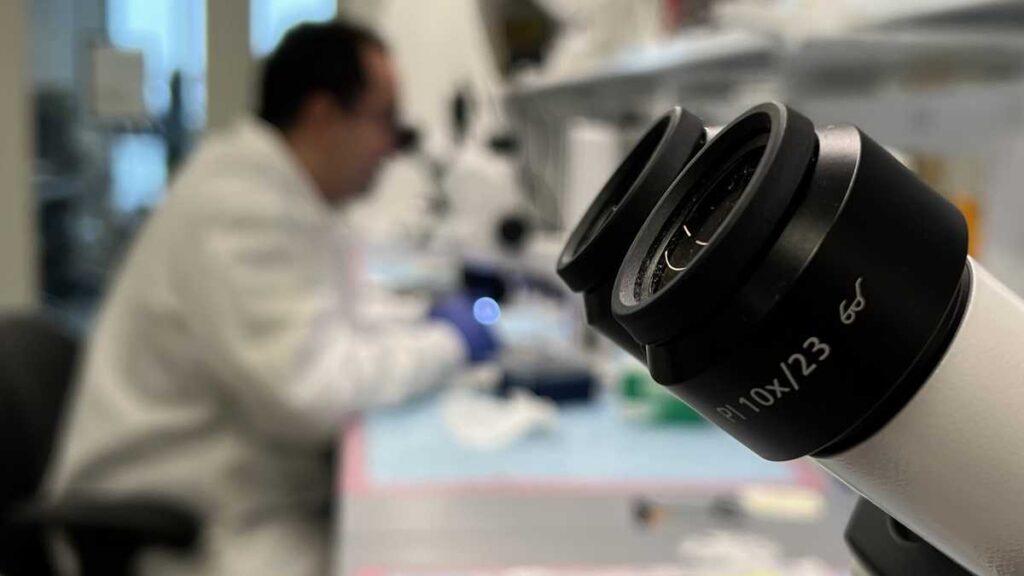The University of Vermont can now say it is a top-tier research institution, across all its colleges. It has been working for several years to attain that ranking. On Thursday, UVM announced it has achieved its goal through the prestigious Carnegie Classification. “This will have an impact on the entire state,” predicted Dr. Richard Page, the dean of the UVM Larner College of Medicine. “The entire state should celebrate this with us, and I hope they will.”The university has achieved what is known as an R1 Research Activity Designation by the Carnegie Foundation for the Advancement of Teaching, administered by the American Council on Education. It basically means UVM is joining the ranks of the nation’s most prestigious research universities.”The science that we accomplish here, the economic impact that our research has, has a positive impact on our entire state,” Page said.The announcement was made inside the University of Vermont’s Firestone Medical Research Building, where studies are underway into heart health, brain function, and life-saving approaches. Dr. Jessica Crothers is working on research that aims to eradicate polio worldwide.”As a young researcher and someone who’s actually from Vermont, it’s been really thrilling to perform that research here in my home state,” Crothers told reporters. UVM called the new status “transformative” and said it expects it will bring more financial backing, help improve recruitment, and lead to more patents and new partnerships. These all have the potential to grow the economy by improving agriculture, technology, health care and other sectors, said Kirk Dombrowski, UVM’s vice president of research and economic development.However, the climate in Washington, D.C. has created uncertainty around funding medical research. President Donald Trump’s administration has made attempts to tighten the flow of federal funds to research institutions through the National Institutes of Health. A federal judge has blocked that move for now.Dombrowski said UVM has not seen any termination notices on grants.”We’re not pessimistic right now and we’re not panicking,” Dombrowski said in an interview with NBC5 News. “We just don’t picture a world in which great science is not going to be valued. Despite all the rhetoric and concern and so on, great science, great discovery, great knowledge production, great kinds of scholarship across our campus will continue to be a value to the world and the world will value that.”The new designation as an R1 research institution will be reviewed every three years, Dombrowski explained, to ensure UVM is continually elevating the quality of its research and demonstrating its impact. UVM is Vermont’s first university to achieve an R1 Research Activity Designation, Dombrowski added.
The University of Vermont can now say it is a top-tier research institution, across all its colleges. It has been working for several years to attain that ranking. On Thursday, UVM announced it has achieved its goal through the prestigious Carnegie Classification.
“This will have an impact on the entire state,” predicted Dr. Richard Page, the dean of the UVM Larner College of Medicine. “The entire state should celebrate this with us, and I hope they will.”
The university has achieved what is known as an R1 Research Activity Designation by the Carnegie Foundation for the Advancement of Teaching, administered by the American Council on Education. It basically means UVM is joining the ranks of the nation’s most prestigious research universities.
“The science that we accomplish here, the economic impact that our research has, has a positive impact on our entire state,” Page said.
The announcement was made inside the University of Vermont’s Firestone Medical Research Building, where studies are underway into heart health, brain function, and life-saving approaches. Dr. Jessica Crothers is working on research that aims to eradicate polio worldwide.
“As a young researcher and someone who’s actually from Vermont, it’s been really thrilling to perform that research here in my home state,” Crothers told reporters.
UVM called the new status “transformative” and said it expects it will bring more financial backing, help improve recruitment, and lead to more patents and new partnerships. These all have the potential to grow the economy by improving agriculture, technology, health care and other sectors, said Kirk Dombrowski, UVM’s vice president of research and economic development.
However, the climate in Washington, D.C. has created uncertainty around funding medical research. President Donald Trump’s administration has made attempts to tighten the flow of federal funds to research institutions through the National Institutes of Health. A federal judge has blocked that move for now.
Dombrowski said UVM has not seen any termination notices on grants.
“We’re not pessimistic right now and we’re not panicking,” Dombrowski said in an interview with NBC5 News. “We just don’t picture a world in which great science is not going to be valued. Despite all the rhetoric and concern and so on, great science, great discovery, great knowledge production, great kinds of scholarship across our campus will continue to be a value to the world and the world will value that.”
The new designation as an R1 research institution will be reviewed every three years, Dombrowski explained, to ensure UVM is continually elevating the quality of its research and demonstrating its impact. UVM is Vermont’s first university to achieve an R1 Research Activity Designation, Dombrowski added.

